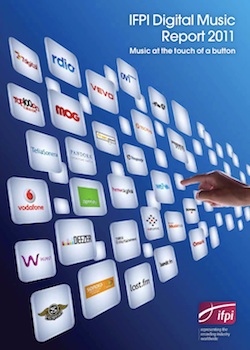It's official: online piracy has only one real solution, and that solution will be taxpayer-funded. International music trade group IFPI today issued its annual report on digital music (PDF), and remarks from CEO Frances Moore sum it all up: "2011 is the year when governments can turn the tide."
Yes, the industry can sue (and win against) Limewire, Mininova, and The Pirate Bay, but it doesn't seem to matter who gets shuttered; piracy persists. Fortunately for IFPI, "there were encouraging signs in 2010 that the tide of government opinion is turning" in the direction of "three strikes" laws.
Governments have not generally acted against small-scale copyright infringers, leaving the defense of their intellectual property up to those companies that reap the benefits of this government-granted right. In the US, the federal government has pursued some larger digital pirates guilty of criminal infringement, usually those involved in commercial offerings or those running larger sites, but it has declined to file charges against even major operations like Napster, Grokster, and Limewire. (This is why the recording industry privately sued tens of thousands of alleged file-swappers and brought lawsuits against the big P2P sites.)
But that costs huge amounts of money—the RIAA has admitted that its own campaign against individuals in the US cost more than it brought in. IFPI now calls individual lawsuits "more punitive and less effective" than its own preferred method—which they certainly are, though this reality doesn't stop its most powerful member, the RIAA, from pursuing a $1.5 million judgment against a Minnesota woman and $675,000 against a Massachusetts man.
"The solution to P2P piracy" now being pushed everywhere that IFPI members operate is a graduated response system in which alleged infringers receive non-judicial warnings through their ISPs, with perhaps some sanction to follow if the infringement continues. France has adopted such a system, as has South Korea. The UK has approved the notices, but no sanctions (yet). Other countries may follow suit.
Going global in 2011

We have yet to see a sustained push for such a government-backed system in the US. The RIAA has abandoned its individual lawsuit strategy in favor of "voluntary" agreements with ISPs—agreements which have yet to materialize. Expect a major push along these lines in the near future, as even IFPI has to publicly admit that "efforts to establish a voluntary system of cooperation have failed in most countries."
So the music industry hopes to make 2011 the year that graduated response goes global. "Tackling digital piracy is ultimately a task for governments," concludes Frances Moore. "This is the opportunity for governments to seize in 2011."
Such schemes can probably have some effect on piracy, and IFPI is right that—if implemented with proper safeguards and reasonable penalties—graduated response is a better approach than, say, trying to destroy some 25-year old's life with multimillion-dollar court claims and years of litigation. But they're only a partial answer, as IFPI's own case studies make clear.
In singling out Sweden, IFPI points to a small reduction in online piracy after Sweden passed the IPRED law giving rightsholders more access to ISP records. But even IFPI admits that most of the change in piratical behavior (56 percent) was because the hot new Spotify music streaming service launched at the same time.
To its credit, the music industry points out just how much progress has been made in licensing all sorts of new business models, with more than 400 online music services now operating worldwide. But with a $4.6 billion worldwide market in digital music, 6 percent growth in digital sales in 2010, and 29 percent of record company revenues coming from digital—it's clear that the industry can survive and even grow without without graduated response (even if the industry exists at only two-thirds the scale it did at its 2000 peak).
As for the argument, still made in the new IFPI report, that legit music services "cannot compete with free," one has only to read the report to see how misleading this is. Where did the 6 percent growth and $4.6 billion in revenue come from? Countries that have magically eliminated online piracy?
reader comments
135